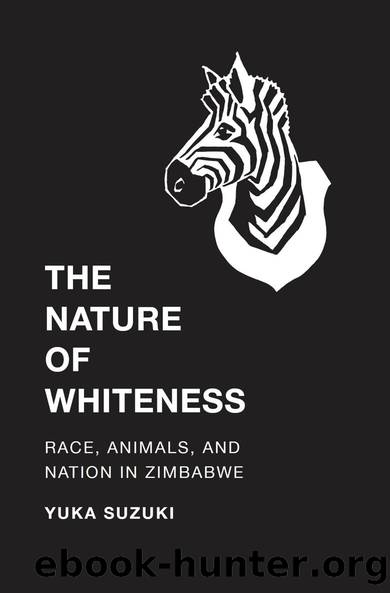The Nature of Whiteness by Yuka Suzuki K. Sivaramakrishnan

Author:Yuka Suzuki, K. Sivaramakrishnan [Yuka Suzuki, K. Sivaramakrishnan]
Language: eng
Format: epub
ISBN: 9780295999548
Barnesnoble:
Publisher: University of Washington Press
Published: 2016-12-01T00:00:00+00:00
ANIMALS, POWER, PRIVILEGE
John Berger begins his influential essay âWhy Look at Animals?â by disavowing a certain perspective: âTo suppose that animals first entered the human imagination as meat or leather or horn is to project a 19th century attitude backward across millennia. Animals first entered the imagination as messengers and promisesâ (1991:4). Animals figure prominently in our social and moral landscapes because they make themselves readily available as mirrors and metaphors. These days, as boundaries between local and global disappear and people mobilize increasingly creative ways of debating difference, animals have become deeply intertwined in human identity politics. Whether in the construction of gender, race, class, indigeneity, or citizenship, animals constitute sites of political struggle, serving as cornerstones for âprogressiveâ social movements and the focal points around which âtraditionalâ cultures are reified. As a consequence, animals are fundamentally constitutive of human societies, or, as Claude Lévi-Strauss (1963b) would say, animals are âgood to thinkâ with.
While many of anthropologyâs classical texts engaged the role and function of human-animal relationships in culture, the animals themselves were seldom objects of interest. The past two decades, in contrast, have seen a renewed focus on animals, in an âanimal momentâ that attempts to include animal perspectives (Emel and Wolch 1998). The impetus for the animal moment is articulated in close dialogue with movements in popular culture, where conservation discourses proliferate, marketing empires are built on dinosaurs, and cloned sheep are presented as scientific triumph. With their increasing visibility, moreover, animals have become subjects of intense contestation. With the changes brought by transnational migration, for example, contemporary conflicts within nation-states often erupt around âanimal-based practices,â or cultural practices that involve the use of animals in some form (Elder et al. 1998). Through the decontextualization and racialization of subaltern animal practices, immigrants and minorities are stigmatized as savage, primitive, and uncivilized, while dominant groups remain comfortably within the zone of the ethical and humane. Masquerading under the guise of concern for animal welfare, xenophobia and racism thus find a convenient entrée into public discourses where they might otherwise not be tolerated. As a consequence, certain animal practices are used as âtools of cultural imperialism designed to delegitimize the subjectivity and citizenshipâ (Elder et al. 1998:73) of those labeled Other in the nation-state.5
The use of animals in justifying contemporary inequalities extends to other dimensions as well; animals are often utilized in symbolic representations of power and privilege. The custom of designating certain creaturesâthe more majestic, the fiercer, the betterâas the distinctive province of monarchies and aristocracies recurs across space and time (Hay 1975). The hunting of such animals was usually conducted with a great deal of fanfare, emphasizing exclusivity of access and reinscribing power differentials between classes. Imperial policies were often patterned on the same model by transforming wildlife into a highly charged domain restricted to government officials and settlers (Mutwira 1989; MacKenzie 1988); at the same time, colonial hunts functioned as spectacles in the enactment and performance of imperial sovereignty, winning colonial subjects through a form of âpredatory careâ (Pandian 2001).
Download
This site does not store any files on its server. We only index and link to content provided by other sites. Please contact the content providers to delete copyright contents if any and email us, we'll remove relevant links or contents immediately.
| Central Africa | East Africa |
| North Africa | Southern Africa |
| West Africa | Algeria |
| Egypt | Ethiopia |
| Kenya | Nigeria |
| South Africa | Sudan |
| Zimbabwe |
Goodbye Paradise(2972)
Men at Arms by Terry Pratchett(2408)
Tobruk by Peter Fitzsimons(2064)
Pirate Alley by Terry McKnight(1911)
Arabs by Eugene Rogan(1838)
Borders by unknow(1789)
Belonging by Unknown(1472)
The Biafra Story by Frederick Forsyth(1327)
It's Our Turn to Eat by Michela Wrong(1305)
Botswana--Culture Smart! by Michael Main(1238)
A Winter in Arabia by Freya Stark(1226)
Gandhi by Ramachandra Guha(1196)
Coffee: From Bean to Barista by Robert W. Thurston(1184)
Livingstone by Tim Jeal(1153)
The Falls by Unknown(1142)
The Source by James A. Michener(1135)
The Shield and The Sword by Ernle Bradford(1102)
Egyptian Mythology A Fascinating Guide to Understanding the Gods, Goddesses, Monsters, and Mortals (Greek Mythology - Norse Mythology - Egyptian Mythology) by Matt Clayton(1088)
Africa: Altered States, Ordinary Miracles by Richard Dowden(1080)
